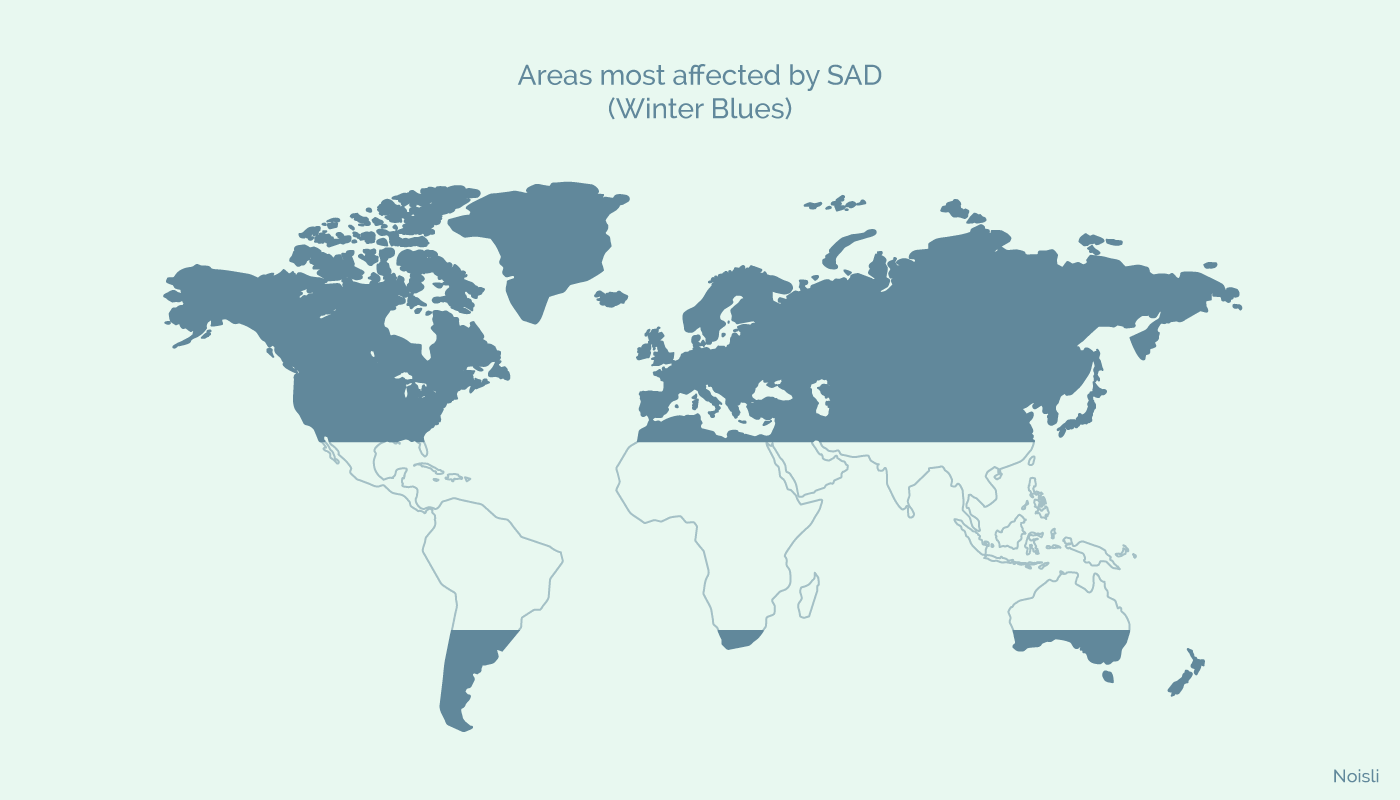What is winter blues and how can you beat it
Wellbeing
Most of us like to do a weather check first thing in the morning, and so do I.
During this time of the year, more often than not, you open the blinds and well…all you see is that same grey sky, over and over again.
And that’s not all: you might even feel sadder than usual, you might have to deal with frequent ups and downs in your mood and have this overall feeling that you’re running on a very very low energy level.
Well, you’re not alone: It’s called Winter Blues, or Seasonal affective disorder (SAD).
Seasonal affective disorder (SAD), also known as winter depression, winter blues, summer depression or seasonal depression, is a mood disorder subset in which people who have normal mental health throughout most of the year experience depressive symptoms at the same time each year, most commonly in the winter.
Typically, the countries lying more than 30° of latitude north and south of the equator are more affected by SAD. The infographic below shows why winter blues is more common in the northern hemisphere than elsewhere.

What causes the winter blues?
1. Lack of light
Already on June 21st, the days are becoming shorter and shorter until reaching the peak —the longest night on December 21st. Therefore, during the months between October and March there is the most lack of sunlight, often combined with bad weather and grey clouds.
Once the spirit of Christmas is over, and all those Christmas lights get tucked away, we really start to feel the lack of sunlight and its effects on our mood.
2. Vitamin D Deficit
Vitamin D is naturally produced by your body when your skin is exposed to sunlight. Depending on your type of skin you may need more (dark-skinned), or less (fair-skinned) exposure to the sun in order to produce enough Vitamin D.
The farther away you live from the equator, the more difficult it is to produce enough Vitamin D, especially during winter months. A deficit in vitamin D can make you 11 times more prone to be depressed.
3. Increase in melatonin
Exposure to sunlight during the day represses the production of melatonin, which makes you feel awake and alert. Due to the lack of light, our body releases a bigger amount of melatonin during winter than during the summer months.
High blood levels of melatonin trigger sleep and a drop in body temperature causing sleepiness, a feeling of sluggishness and the loss of energy during your day.

4. Circadian Rhythm
Considering the above points, your natural sleep cycle might likely be messed up as well. This can make you feel sleepy, groggy and give you a hard time waking up in the morning.
5. Low production of serotonin
Lack of light is also responsible for a lower production of serotonin. Serotonin is a neurotransmitter that is responsible for various factors in our body and central nervous system, such as our mood, anxiety and happiness.
A deficit in serotonin production can lead to depression but also affect sleep, appetite, and memory.
How to beat the winter blues
1. Sun’s out = you go out
Whenever you see the sun coming out and you have the chance, get yourself out there. It is very important to catch at least 10 minutes of sunlight every day.
2. Window seats
Window seats are your friend, so next time don’t shy away of catching the seat next to the window. It not only increases your chance of catching some sunlight but it will hopefully also reward you with a lovely view instead of staring at a blank wall.
3. Bright colours
Winters are grey and dark so bringing some bright colours into your home can certainly make a big difference. Treat yourself with some bright flowers, colourful bedding or some new cushions.
4. Indoor lightning
Surround yourself with more indoor lights, open your blinds and move away any furniture that is blocking the light from coming into your home. You can also change your lightbulbs with ones that simulate the daylight.

5. Physical exercise
Moving your muscles will release the feel good chemicals serotonin and endorphins.
Especially aerobic exercise like walking, running, swimming or biking are the most effective at increasing serotonin levels in the brain.
It is proven that exercising is very effective against mild depressions and can help with sleep. Walk whenever you can and try to do at least 2-3 workouts a week of 30 minutes each.
6. Socialising
People that suffer from winter blues tend to isolate themselves more than usual. Try to meet up for a coffee instead of chatting over Facebook, join new classes or invite your friends for some social evening activity.
7. Relax
Since winter blues can also make you feel angry, irritable, stressed, or anxious it is important to take special care of your well being. You can opt for relaxation techniques or meditation in order to destress and relax.
8. Comedy
Laughter, and even just the anticipation of it, will release endorphins. Actively seek out fun activities, watch comedy and do things that will make you laugh.



